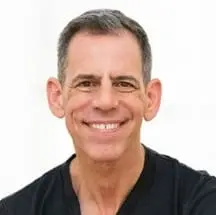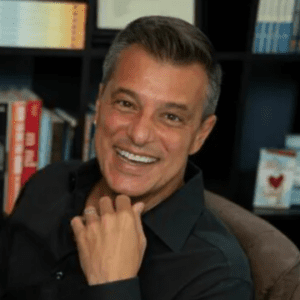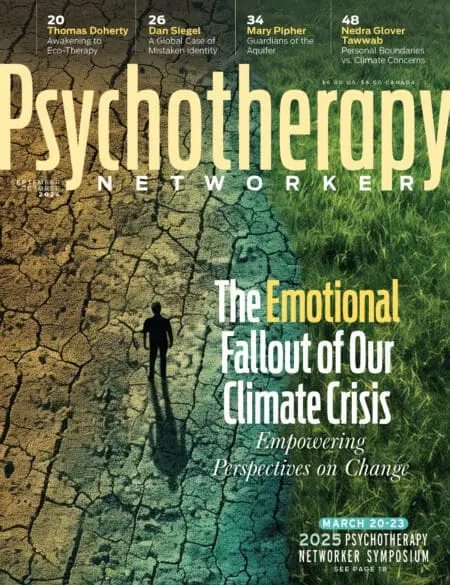When you start to list all of Dr. Frank Anderson’s accolades, it’s easy to get lost. Author, therapist, clinical instructor and trainer, Hollywood consultant, advisor, trauma expert, psychiatrist… Even he has trouble keeping up.
“I’m a weird combination,” says Frank Anderson. “I’m a psychiatrist. But sometimes even I forget that I’m a psychiatrist. Because I don’t do typical psychiatry stuff anymore.”
Coming from someone with such a strong reputation in trauma, Anderson’s comment is intriguing. Many people in the psychotherapeutic field shift their emphasis and focus over time, but he has taken his skills to a whole new area.
“It’s really work that I feel passionate about,” he says.” And all the things I do—teaching and writing and speaking—are all aligned with that.”
A Different Perspective
It takes courage to look at the long-studied field of trauma research and treatment and suggest there’s a better way. That’s just what Anderson does.
“I think psychotherapy is important, but it’s not one-size-fits-all, and I think there are limitations to psychotherapy. As the world evolves, accessibility is important. For example, there’s a way for people to access through social media in a way that they could never access or afford in psychotherapy.”
When it comes to accessibility, Anderson sees the value of social media. He demonstrates this with his own psycho-educational presence on apps like TikTok, Facebook, and YouTube. With nearly 30,000 followers on Instagram, Anderson is clearly a leading voice online in the field.
“I like moving us forward in these ways that are challenging for the field,” he adds. “I don’t think people are going to go to therapy in the same way. I think they’re going to do therapy on their phone.”
Though that version isn’t without its pitfalls. Anderson notes that although social media users can put their problems into a chat bot or search for them on social media, that’s not always helpful. He explains, “I have this value for coaches and people who are not therapists who are bringing [accessible change]. I think there’s some limitations when people are not trained—especially when you’re talking about severe trauma.”
Personal Experience of Trauma
As a gay man, Anderson knows about transcending trauma—he’s done it himself. When he was six, he was sent to a site for testing because he played with dolls. “I spent five years in conversion therapy of sorts,” he shares. “Back then it was considered a disorder. They didn’t send me away to a camp, but they sent me to therapy. I was being programmed. I have very little memory of the whole experience because I dissociated through most of it, but the message was very clear. I was wrong, and I had to be made right.”
In addition to this, years later when Anderson was in college, his younger sister suffered a psychotic break during her first year of high school. The event devastated him, and he desperately wanted to save her. He was in school to be a pharmacist like his father, but the situation changed his trajectory.
Anderson trained as a psychiatrist at Harvard Medical School and subsequently worked with Bessel van der Kolk in the early days at The Trauma Center in Boston. He was at the right place at a very important time: it’s where he immersed himself in treating and teaching about trauma.
Finding Purpose and Healing Through Storytelling
“After the release of my second book, I feel like I got my purpose,” he says. “I remember the moment I went for a run after that book got released, and I said, Okay, world, it’s yours. It was kind of the culmination of my professional life for sure.”
Writing books brought Frank into his proper field: healing through storytelling. He makes the trauma of pain and life understandable; his voice isn’t overintellectual or intimidating, and he somehow makes trauma simple and easy to understand.
More specifically, through his books and content, Frank brings trauma healing to the world with his own voice and sharing through the lens of Internal Family Systems, transcending trauma to get to a better place inside. “I went from being a button-up Harvard professor to being an influencer,” he notes.
Such reach means more people might be able to process their trauma, people who, for example, can’t necessarily afford therapy. “I just kept getting this message: You’re here to bring trauma healing to the world. You’re here to bring love, compassion, and unity. I didn’t even know what it meant at the time. It feels larger than me. I’m moving out of the realm of psychotherapy into the general public as I’m bringing trauma healing to the world—moving and translating this message out of the therapy room.”
Expertise and Experience
Anderson’s style, warmth, and informality make him approachable. Others who have attained his level of professional expertise have a tendency to sound condescending at times; Anderson is different. He speaks a language that makes the complexity of trauma work understandable, that breaks it down simply.
Scaling what he does wasn’t just about his vibrant warmth and personality—it also involves finding a new language with which to present it. “There’s an aversion to the word trauma, but people can relate to overwhelming life experience,” he says. “I’m translating our therapy-speak into everyday language.”
Which may be exactly where it belongs.
Rick Miller
Rick Miller, LICSW, is an internationally recognized inspirational speaker, psychotherapist, and author. He is a pioneer in creating mind/body and hypnotic scripts for gay men, has trained medical and mental-health providers in creating and using them, and wrote the first-ever book on the topic. He is the founder and executive director of Gay Sons and Mothers, a nonprofit organization providing education around the powerful influence mothers have on their gay sons. He’s also created a series for clinicians, Secrets of the Masters, in which he interviews noted authorities in informal settings.
Frank Anderson
Frank Anderson, MD, is a world-renowned trauma treatment expert, Harvard-trained psychiatrist, and psychotherapist. He’s the acclaimed author of Transcending Trauma and coauthor of Internal Family Systems Skills Training Manual. As a global speaker on the treatment of trauma and dissociation, he’s passionate about teaching brain-based psychotherapy and integrating current neuroscience knowledge with the Internal Family Systems model of therapy. Contact: frankandersonmd.com













